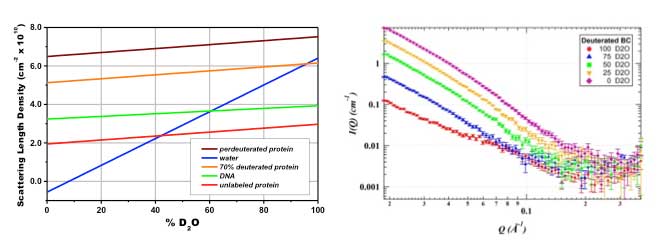Bio-Deuteration Laboratory
The Bio-Deuteration Laboratory (BDL) has been established at Oak Ridge National Laboratory (ORNL) for the production of 1H/2H-labeled biological macromolecules to support the neutron structural biology research and user programs at ORNL’s neutron scattering facilities. Studies at these facilities are enhanced by the design and production of selectively, partially, and fully-deuterated biological macromolecules. Deuterium-labeling provides contrast and allows portions of macromolecular structures to be highlighted and analyzed in situ.
Using the BDL
The Bio-Deuteration Laboratory is operated to support the structural biology community. If you would like to become a BDL user, applications can be submitted in parallel to your neutron beamtime proposal and will be screened for feasibility. Please contact 865.574.4600 or BDLUsers@ornl.gov for further information.
Controlling 1H/2H-Content to Provide Contrast
Neutron scattering studies are greatly enhanced by the design and production of specific, random and uniform hydrogen/deuterium labeled biological macromolecules that permit selected parts of macromolecular structures to be highlighted and analyzed in situ. CSMB has established the Bio-Deuteration Laboratory for in vivo production of hydrogen/deuterium-labeled bio-macromolecules for research conducted at HFIR and SNS.

The Bio-Deuteration Laboratory provides neutron users with access to facilities and expertise for cloning, protein expression, purification and characterization of deuterium-labeled biological macromolecules and trains visiting researchers in the use and application of these techniques. These capabilities will allow our facility users to design and produce proteins, complexes and macromolecular assemblies that are optimized for neutron scattering analysis and will enable these data to be used to construct biologically meaningful models of protein complexes, assemblies and hierarchical structures.
